- Home
- Aaron Allston
Mercy Kil Page 14
Mercy Kil Read online
Page 14
“I think you mean low-population worlds. Itty-bitty worlds don’t have enough gravity to hold an atmosphere. And without an atmosphere, you can’t have an open-air market.”
“Gravity is a myth.”
The pilot saw Face’s speeder slow, then descend vertically on repulsors to occupy a landing square. He looked around, found another one, not far from Face’s, and settled into place there.
Together, the three watched as the pilot’s door of the black speeder rose, wing-style. Face Loran emerged, a distracted look on his face. He had a comlink pressed to his ear and was clearly having trouble hearing over the roar of voices from the marketplace and whine of airspeeders overhead. He shouted, loud enough that the occupants of the blue speeder could hear him: “No, you idiot. Earrings. Anniversary present. Which booth are you?” He hurried in the direction of the nearest row of booths, his body language indicating impatience.
The blond pilot smiled. Face Loran would be comparatively easy to follow in the crowds. His clothes—black, fitted, stylish, and pretentious, matching his trim little beard and mustache—and his bald scalp made him stand out.
“It’s a trick.” The Sullustan’s musical voice made the words sound more friendly than suspicious.
“What’s the Jawa say?” the Aqualish asked.
“He says it’s a trick.”
“It doesn’t matter.”
“What’s the Aqualish say?”
The pilot grinned. “He says you’re a Jawa.”
“I’m not a Jawa, and it’s a trick. He spotted you, and he’s lured us to this crowded, confusing place so he can lose us.”
“What’s the Jawa say?” the Aqualish asked.
“He says he’s not a Jawa, and that you’re wrong.”
“He’s a Jawa. An ugly Jawa. If you were as ugly as he is, you’d pretend to belong to a made-up species, too. Sullustans are a myth.”
“What’s he say?” the Sullustan asked.
The pilot heaved a sigh. “He says you and he should chase after Face Loran and kill him while I wait here in case it is a trick and he doubles back and tries to escape you. And I agree. Get going.”
The Aqualish slammed his door open and exited. “I will also keep my eyes open for a stand selling thermal detonators.”
By the time the Aqualish and the Sullustan reached the first row of stalls, Face Loran was nowhere to be seen.
Standing between a booth selling toy lightsabers that made realistic sounds and extended harmless shafts of colored light, and another where the most popular candies were Corellian-brandy-flavored, the Aqualish and the Sullustan turned back and forth with the rhythm of droid gun emplacements scanning for targets.
“Don’t see him.” The Aqualish’s voice was a grumble. He stared down at his companion. “You see his knees anywhere?”
The Sullustan spoke to him, musical words the Aqualish didn’t understand.
“Hey, short stuff, I have a great idea.” The Aqualish bent over, caught the Sullustan under his arms, and lifted. The Sullustan squalled and flailed as if afraid the Aqualish was going to drop him into the tentacled maw of a sarlacc. Then the Aqualish settled his short companion astride his shoulders. “Now you can see more than his knees.” The Aqualish pointed at his own eyes, then at the Sullustan’s eyes, then at the crowd.
The Sullustan seemed to get it. He nodded and resumed his scanning. The Aqualish set off into the crowd.
The Aqualish had spoken disparagingly of this market, but it really was his kind of environment. A buyer could see beings of every known species and find goods from all over Coruscant and around the galaxy—cheap junk, entertainments, exotic foods, sometimes good weapons. A Rodian male sidled up to the Aqualish, offering glitterstim bites—tiny quantities of the psychotropic chemical encased in lightproof, sweet carbohydrate shells—for sale. The Aqualish handed him a few credcoins for a small packet, but leaned over the seller with some advice: “If this isn’t the real thing, I come back and kill you good.”
“It’s real, it’s real.” Unbidden, the seller pressed an extra bag into the Aqualish’s finned hand and fled.
The Aqualish stared at the two bags, then glanced up at his rider. “Means it’s real, but weak. We see how weak. Maybe I don’t kill him.”
The Sullustan jabbered in reply.
“Shut up. You know I don’t speak Jawa.” He handed the Sullustan the second bag of spice candy.
A minute later, the Sullustan straightened, sitting higher, and pointed off into the crowd. The Aqualish stared that way.
Thirty meters ahead along the row of stalls, Face Loran stood, retrieving a credcard from a vendor. Of all things, he had an entire mannequin under his arm. It was built along the lines of a human woman but was headless. It wore garments suited to an exotic dancer, all abbreviated bands, strips, and scarves in filmy red and pink material. Face Loran had other purchases tucked under his arm as well: folded masses of brown cloth. As the Aqualish watched, Face Loran turned away with his new prizes and moved briskly off in the other direction.
The two exchanged a look. The Sullustan jabbered something.
The Aqualish shrugged. “I bet that means the earrings were no good.”
The Sullustan looked blankly at him.
The Aqualish took off after their target, his rider holding firmly on to his shoulders and head.
By the time they caught sight of Face Loran again, he was down a side row, his mannequin still clutched under his arm, but now he was towing a small cloud of large pink balloons on a string behind him.
From that point, it was comparatively easy to find him. All they had to do was watch for the cluster of pink balloons. The problem was that Face Loran kept in constant motion, trotting from one booth to the next, taking a zigzag course through the market. Sometimes their view of the balloons was blocked for long moments by a tall booth or banner.
Then, at the far edge of the market, they cornered their quarry. He was not at a booth but in a tent, the sign above it flashing with an ever-changing litany of entreaties: HOLOSTILLS! PUT YOUR FACE ON AN ATHLETE’S BODY! EMBRACE HEVANUS DREED OR KOY’TIFFIN! STAND BESIDE THE GLORIOUS CANYON OF NO RETURN! Face’s string trailed out through the tent flap, the balloons wavering a few meters overhead.
The Aqualish set down the Sullustan. He gestured in accompaniment to his words. “I go in and kill him. Stab-stab-stab, understand? You wait here. Here.”
The Sullustan scowled and jabbered at him but moved to stand against the row of tents and booths opposite, watching the front of Face’s tent.
The Aqualish slid a fin under his robe and wrapped it around the hilt of the sheathed vibroblade there. This was a knife job—quiet was better, even in this loud environment. Cautiously, he moved up to the tent, parted its flap with his free fin, and entered.
It was dark within. Directly before him was a screen, taller than a human, of flexible material stretched to tautness by a segmented duraplast frame. It was actually a flexible monitor, glowing with internal light, showing an image from nature. Even from the rear, the Aqualish could recognize a famous image, an iconic waterfall from the destroyed world of Alderaan.
Small pinpoint lights from the far side of the tent shone on the screen, and they silhouetted the Aqualish’s prey. A human shape stood just on the far side of the screen, his head moving back and forth as if he were keeping time to slow music the Aqualish couldn’t hear.
The Aqualish drew his vibroblade, thumbed it into humming life. Then he stabbed, his blade shearing through the screen and plunging into the back of his target’s head.
It popped with a mild bang and disappeared.
The Aqualish stepped around the screen to look.
His victim had been the mannequin. A brown robe hung across it, concealing the flimsy dancer’s garments. The remains of a pink balloon lay across one shoulder. It had been tied to the top of the mannequin, a scarf wrapped around its base to suggest a neck. Before the Aqualish popped it, it had been bobbing in a breeze flowing through t
he tent.
The tent was otherwise empty. A slit in the far side showed where Face Loran had gone.
This was not good. The Aqualish spun, making sure he was indeed alone, then switched off and sheathed his vibroblade. He moved back through the entry flap, alert to the possibility of attack.
The Sullustan was where the Aqualish had left him, but now he was seated on a fruit crate, leaning back against a stall’s support pole, relaxed as if asleep. There was a dark stain, small but spreading, on his tunic.
The Aqualish did not move over to investigate. The Sullustan was dead, and Face Loran was doubtless nearby, prepared to launch a fatal ambush if the Aqualish moved to bend over his slain partner.
But if the Aqualish merely walked away, Face Loran would stalk him, waiting for an ideal time to strike, and then kill him.
The Aqualish chose to outsmart his enemy. He tore off his robe, revealing belt-holstered blaster pistols and sheathed vibroblades, a grenade on a baldric strap, and more buffed, shiny body scales, and charged back toward his boss’s airspeeder.
He slammed vendors and shoppers out of the way with little regard for their mass, species, gender, or age. A crowd of Bothan children flew away from impacts with his knees, shrieking in hurt and surprise. He crashed, unharmed, through a pane of clear duraplast, a replacement window, being carried by two human workers. He slammed a Gamorrean woman clear over the merchandise counter of a stall, leaving her upside down, her legs flailing, her upper body stuck in a barrel of Coruscanti subterranean whitefish.
Though shouts, curses, and calls for security followed him, in moments he could see the far row of the plaza booths just ahead. There was a gap between two of them through which he could escape.
Into the gap stepped a Jedi, a fair-skinned, robed man whose neatly trimmed mustache and beard were darker than his long, loose mane of brown hair. The Jedi’s attention immediately fixed on the Aqualish and he raised his lightsaber, already in hand, thumbing it to life. Its green blade emerged with a deep, vibrating snap-hiss.
The Aqualish slowed his charge and grabbed for his blaster pistol.
But the Jedi, instead of charging, threw his lightsaber. It flew in a spin toward the Aqualish.
If he’d had the time, the Aqualish would have laughed. Instead, he tracked the incoming weapon. He reached for it ... and nimbly caught the hilt in his fin.
Now the Jedi charged forward. He ran like a normal man in good shape, not like a superhuman. The Aqualish swung the lightsaber. Its glowing blade plowed across the Jedi’s neck.
The Jedi’s body thumped into that of the Aqualish, and his head—
Stayed right where it was. There was no mark across his neck. There was no smell of burned flesh.
There was a pain in the Aqualish’s own neck, and the Aqualish belatedly became aware that the Jedi’s right arm was raised, his hand near the point where the pain began.
The Jedi, unhurt, stared into the Aqualish’s face with the eyes of Face Loran. His expression was cold and implacable.
The Aqualish fell, feeling the tug as his neck slid off the vibroblade in Face Loran’s hand, seeing the blade grow still as his enemy switched it off. Then blackness descended over his sight.
Just a few dozen meters away, the blond pilot witnessed the collision between Jedi and Aqualish. He saw the Aqualish collapse, the toy lightsaber in his hand falling to the ground, its harmless green beam playing across the pavestones.
He saw the Jedi turn away before any of the witnesses began to react. The Jedi moved out past the line of stalls, made an immediate right turn to be out of the sight of the shoppers in the marketplace, and whipped the hair from his head, revealing the bald scalp of Face Loran. Loran tossed the wig into the mouth of a droid trash-masher. He shed his costume cloak and robe, hurling them in with the wig. Then he made an abrupt left turn and began walking among the landed speeders.
The blond pilot shook his head in grudging admiration. In two seconds, a mysterious Jedi Knight, menace evident in his posture, had become a bald, black-clad passerby whose body language suggested ease and good cheer. Meanwhile, witnesses to the Aqualish’s death surrounded the body. A couple who cautiously stepped out beyond the row of stalls looked around, saw no sign of the Jedi, and returned to stare at the body.
The pilot paid them no mind. He did watch as a security trooper ran up to take charge of the situation while Face Loran walked, unnoticed by the crowd, to his airspeeder. Loran entered his vehicle.
Well, the pilot had learned something. It appeared that Face Loran was genuinely retired or even exiled from the Intelligence community—he had summoned no backup to deal with this situation. And he clearly had some field experience.
The pilot couldn’t see through the dark viewport of the airspeeder. Loran waited in his vehicle for several minutes, probably watching events unfold around the body. But finally the black airspeeder rumbled into life and rose three meters into the air.
And exploded.
Pieces of the vehicle, twisted and burning, flew in all directions, propelled by a cloud of red and orange and black. The people gathered around the Aqualish screamed. Some were knocked down by the force of the explosion. Parked speeders all around Loran’s rocked and were pelted by debris. The main body of Loran’s speeder dropped, only one landing space over from where it had been, onto a big, red, open-top speeder. They burned together.
The blond pilot blew out a sigh of relief. The Sullustan and the Aqualish had served their purpose—bait, distraction—and so had his explosives package. The job was done.
Well, one job, anyway. He started up his speeder and took it skyward. Now he just needed to kill two Twi’lek women.
Maybe he could find a disgruntled Wookiee who was curious about whether those brain-tails would rip right off.
CHAPTER FIFTEEN
ABOARD CONCUSSOR, OUTER RIM
The new cook, a scarred, tattooed Corellian man who wore a long ponytail and no other hair—but who, Voort had to admit, could cook a fine bantha-topato stew—distributed the last cup of caf to Turman, who sat at the navigator’s console.
On his way off the bridge, the cook stopped and gave Voort a perturbed look. “Will you, ah, require anything special for dinner?”
Voort also had to admit to himself that he warranted a perturbed look or two. He was dressed in the remnants of the gray uniform once owned by Concussor’s captain. Their seams had burst rather than let out, so the garments hung in tatters on him, held in place only by the elaborate array of gun belts and weapons bandoliers with which Voort had draped himself.
Too, across the last couple of days the other Wraiths, in their various disguises, had told many stories about “Gronk.” How his favorite meals involved human meat. How one should never gamble with him, because he couldn’t read cards and always lost ... which inevitably meant death for the other players. How the ends of his tusks and fingernails were coated with invisible slow-acting poison—it was death just to scrap with him. Even for smugglers and pirates anxious to earn a credit by any means possible, the sheer volume of the stories was alarming.
A pity the other Wraiths hadn’t told Voort they were telling these stories. He only discovered the fact after all the new crew members began shying away from him.
He was pondering his answer—the cook understood Gamorrean—when Jesmin, at the sensor officer’s console, still in her security operative identity’s wig and makeup but wearing an Imperial lieutenant’s uniform and insignia, looked up. “Contact. At the limits of sensor range. They’re transmitting ... It’s the priority code we’ve been waiting for.”
Bhindi, now in an Imperial uniform, slouching in the captain’s chair, snapped upright. “Command crew only. Everyone else clear the bridge.”
The cook dashed out. As soon as the door was shut and sealed behind him, Voort activated his throat implant. “It’s about time.” He strode to the navigator’s station as Turman abandoned it.
Bhindi stood up from the captain’s chair but hit the interc
om button on its arm. “Four, Six, we’re on. Report readiness.”
Voices spoke from the chair arm, Trey’s first: “Four here. Engineering clear except for me, and sealed. All power and engines are optimal.” Then Scut responded: “Six in security. Ready.”
Voort shed a belt and a bandolier; they made it hard to sit. He took Turman’s seat and bent over the navigation controls. “Transferring pilot controls to my station. Complete.”
“Transferring communications controls to my station.” Jesmin sounded as cool and unworried as Bhindi and Voort had. “Complete. Sensors now indicate the contact is a small warship, probably corvette, probably twice our mass and weaponry. But not huge. They’re approaching at cruise speed.”
From the corner of his eye, Voort glimpsed Turman performing a high-speed identity change. The man threw his tunic into a corner; from an emergency equipment locker in the bulkhead, he pulled the white-haired, aristocratic-featured neoglith masquer Scut had made for him. He donned it in seconds, then slipped into clothes from the same locker, a tidy gray uniform with a lieutenant commander’s rank insignia on the breast.
Voort nodded, satisfied. In years past, he’d seen Face do it faster, but Face had never had to deal with a neoglith masquer. Voort rated Turman’s effort as a tie with Face’s.
Turman, now Lieutenant Commander Hocroft, took the captain’s chair. “Ready.” His voice bore the clipped accent that was natural to upper-class Coruscant citizens and affected by many Imperial officers.
Bhindi moved to sit at the station between Jesmin and Voort. “Weapons and deflectors down but ready to raise. Comm, are they hailing?”
Jesmin nodded. “Just now. Alliance corvette Starhook, Captain Evlen commanding.”
Bhindi considered. “Voyce Evlen. Just promoted to captain. This is her first command. I’m sorry to hear she might be mixed up with Thaal. I know her family. Her mother is Admiral Biana Drayce.”
Turman cleared his throat. “Go?”
“One second. Sensors, make sure Voort’s not in the holocam view.”

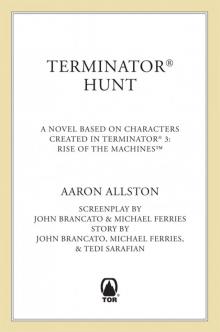 Terminator 3--Terminator Hunt
Terminator 3--Terminator Hunt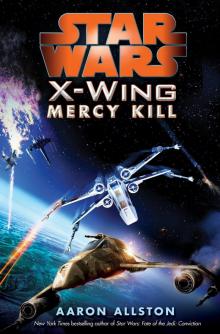 Mercy Kil
Mercy Kil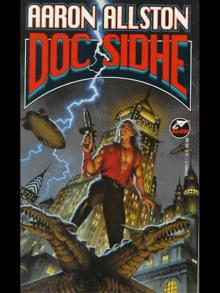 Doc Sidhe
Doc Sidhe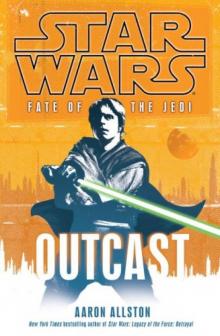 Star Wars: Fate of the Jedi: Outcast
Star Wars: Fate of the Jedi: Outcast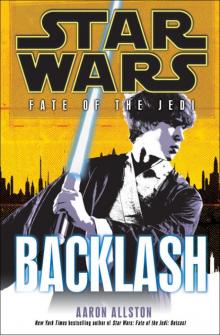 Fate of the Jedi: Backlash
Fate of the Jedi: Backlash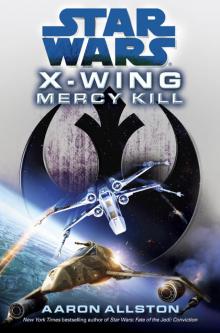 Mercy Kill
Mercy Kill Rebel Stand
Rebel Stand Wraith Squadron
Wraith Squadron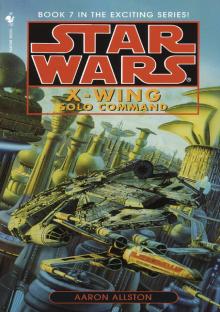 Star Wars: X-Wing VII: Solo Command
Star Wars: X-Wing VII: Solo Command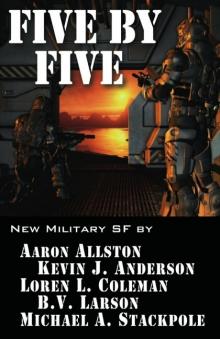 Five by Five
Five by Five Solo Command
Solo Command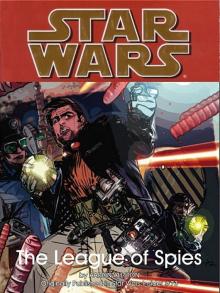 Star Wars: The Clone Wars Short Stories: The League of Spies
Star Wars: The Clone Wars Short Stories: The League of Spies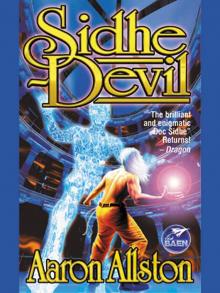 Sidhe-Devil
Sidhe-Devil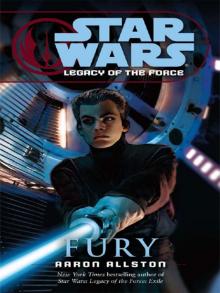 Star Wars: Legacy of the Force: Fury
Star Wars: Legacy of the Force: Fury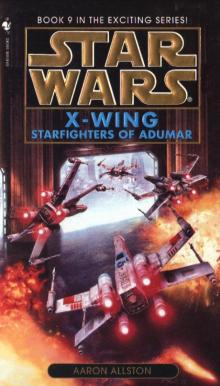 Starfighters of Adumar
Starfighters of Adumar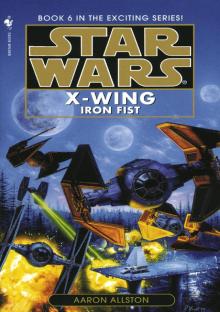 Star Wars: X-Wing VI: Iron Fist
Star Wars: X-Wing VI: Iron Fist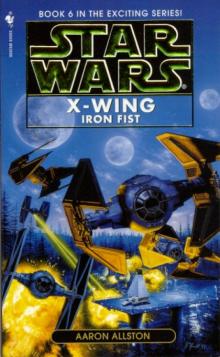 Star Wars - X-Wing - Iron Fist
Star Wars - X-Wing - Iron Fist Exile
Exile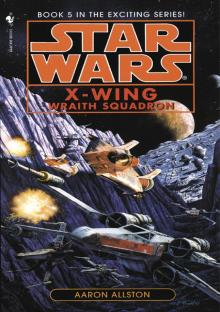 Star Wars: X-Wing V: Wraith Squadron
Star Wars: X-Wing V: Wraith Squadron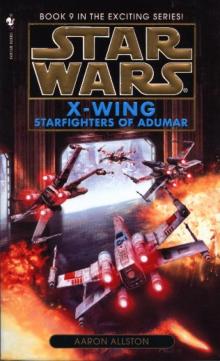 Star Wars - X-Wing - Starfighters of Adumar
Star Wars - X-Wing - Starfighters of Adumar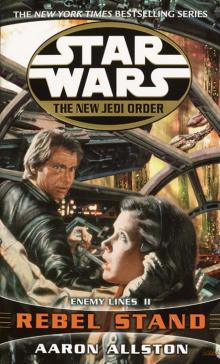 Rebel Stand: Enemy Lines II
Rebel Stand: Enemy Lines II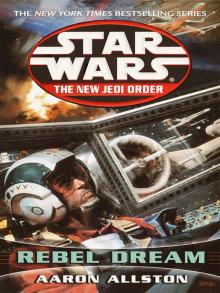 Rebel Dream: Enemy Lines I
Rebel Dream: Enemy Lines I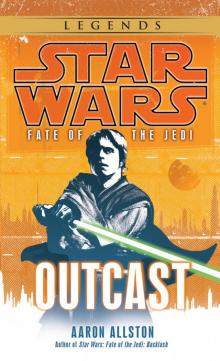 Outcast
Outcast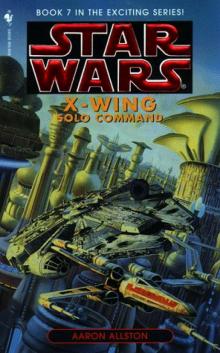 Star Wars - X-Wing 07 - Solo Command
Star Wars - X-Wing 07 - Solo Command